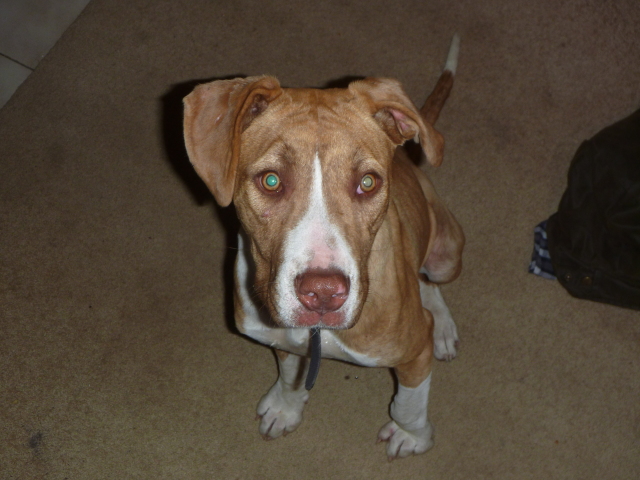Questionhi we have a beautiful German shepherd/Alsatian dog who is 7 years old, he has terrible movement in his back end and sometimes cant even get up because his legs are so stiff. one of his legs is worse than the other and this sends him off balance so we have to prop him up. we love him so much we don't want to have him put down but cant bear to see him in pain and frustrated because he cant move about too well. once he is moving he is generally a lot better but as soon as he stops he starts to lean again. we have been told by a lady who kept this breed that she had the same problem and that cortisone injections would help him. can you please tell me if this is true as we will try anything regardless of any costs, and if cortisone wont work could you give us any suggestions on what might? thanks for your time.
AnswerHi Clare,
You didn't say if you've had your dog examined by your vet, but the condition you're describing sounds a whole lot like hip dysplasia, possibly combined with osteoarthritis. The German Shepherd breed (and all large dogs) are prone to develop this inherited condition.
Through proper diet, moderate exercise (to your dog's ability), supplements, anti-inflammatories, and pain relief, you may be able to slow the progression of this degenerative joint disease.
Corticosteroids have been used for many years to treat the pain and inflammation associated with osteoarthritis and hip dysplasia. Corticosteroids act as a potent anti-inflammatory, but unfortunately, have many undesirable short- and long-term side effects. However, there is a time in the course of hip dysplasia when the risk/benefit balance begins to favor the use of corticosteroids. Because of these side effects and the advent of newer, more specific drugs, corticosteroids are generally only used in older animals with flare-ups where all other pain control products have failed. You can discuss with your vet the best medication for your dog.
Starting your dog on a Glucosamine and Chondroitin supplement might help with mobility. You need to give this supplement daily for at least a month (sometimes two) before results may be seen. Most pets need to be on Glucosamine therapy for the rest of their lives. Studies have shown that cartilage degeneration will reoccur about four to six months after the product is discontinued. Talk to your vet for a brand recommendation and dose, as the concentration of actual glucosamine and chondroitin vary from product to product. Products that contain human grade glucosamine and chondroitin are much more likely to be of high quality and in a purer form.
Another option may be Adequan, which is an injectable form of Glucosamine, if your dog's condition isn't too advanced. A series of shots are given over weeks and very often have favorable results. This product helps prevent the breakdown of cartilage and may help with the synthesis of new cartilage.
Also ask your vet about giving your dog a Vitamin C supplement. Vitamin C acts as an antioxidant and is an important nutrient in the synthesis of collagen and cartilage. Because dogs can manufacture their own Vitamin C and do not require it in their diet like humans do, the efficacy of using Vitamin C in the management of osteoarthritis in dogs remains unclear. Supplementing with Vitamin C at a reasonable level will not result in a toxicity and may prove to have a beneficial effect.
Vitamin E, another anti-oxidant, and marine fish oils (such as 3V Capsules) is be beneficial to some dogs with chronic degenerative joint disorders. Again, get a dose recommendation from your vet.
Acupuncture is sometimes used in dogs with hip dysplasia and arthritis. I've read opinions have varied from not helpful to very helpful. It is a safe thing to try, if you can afford it. You can find a veterinary acupuncturist here:
http://www.aava.org/pub/directory_links_public.html
http://www.ivas.org/member_search.cfm
Each dog with hip dysplasia/arthritis will need to have a management program specifically designed for his needs. What helps one dog, may not help another. Work with your veterinarian and watch your dog carefully so that between you, your dog, and your veterinarian you can determine what is best for your dog. Realize, too, the program may need to be changed as your pet ages, or if symptoms change.
Best of luck,
Patti

 Puppy hates being alone.
Question
Me and Toby
Our jack russel is extremely cuddl
Puppy hates being alone.
Question
Me and Toby
Our jack russel is extremely cuddl
 Diarrhea in Nursing Bitches
QuestionAtrix & Pup
QUESTION: My Champion Mi
Diarrhea in Nursing Bitches
QuestionAtrix & Pup
QUESTION: My Champion Mi
 Anxiety separation????
Question
donovan
HI then, I got my schnauzer when it w
Anxiety separation????
Question
donovan
HI then, I got my schnauzer when it w
 8wk old pup biting
Question
pebbles
hi i wonder if u can help me my
8wk old pup biting
Question
pebbles
hi i wonder if u can help me my
 Malnurished Bull Mastif x Great Dane ;
Question
Sticks
Hi,
Ive recently, (the last 24 hours) b
Malnurished Bull Mastif x Great Dane ;
Question
Sticks
Hi,
Ive recently, (the last 24 hours) b